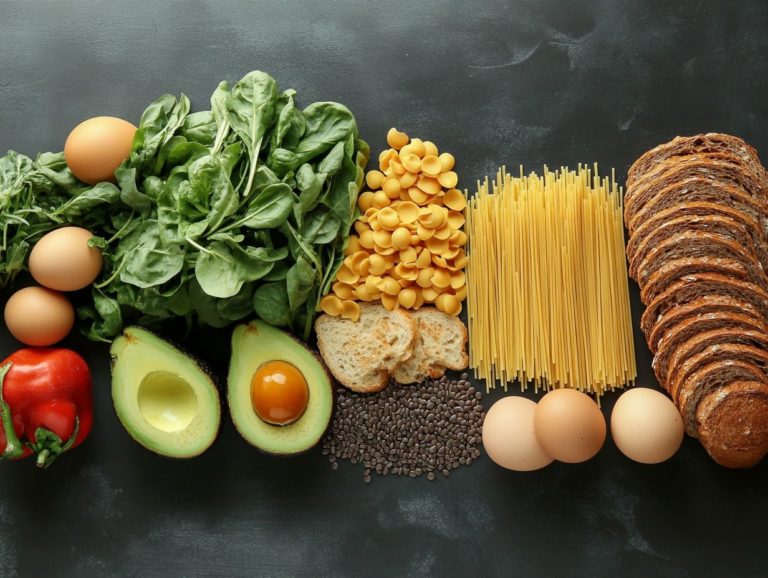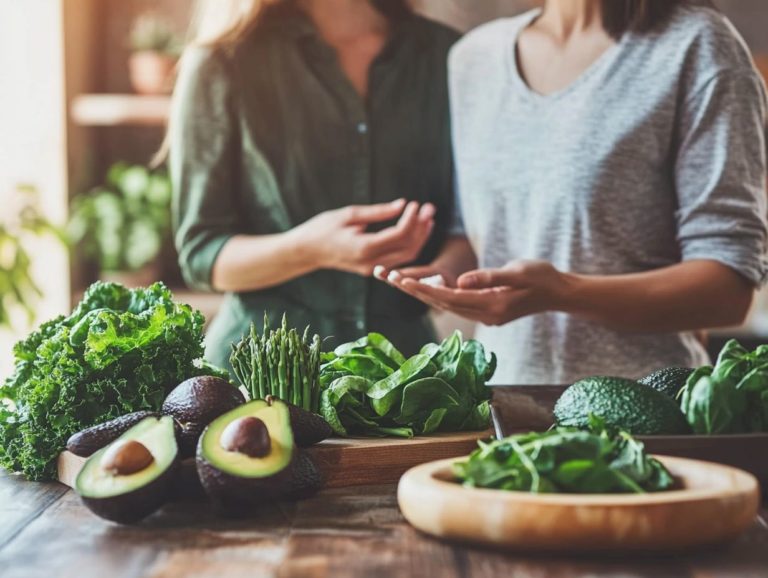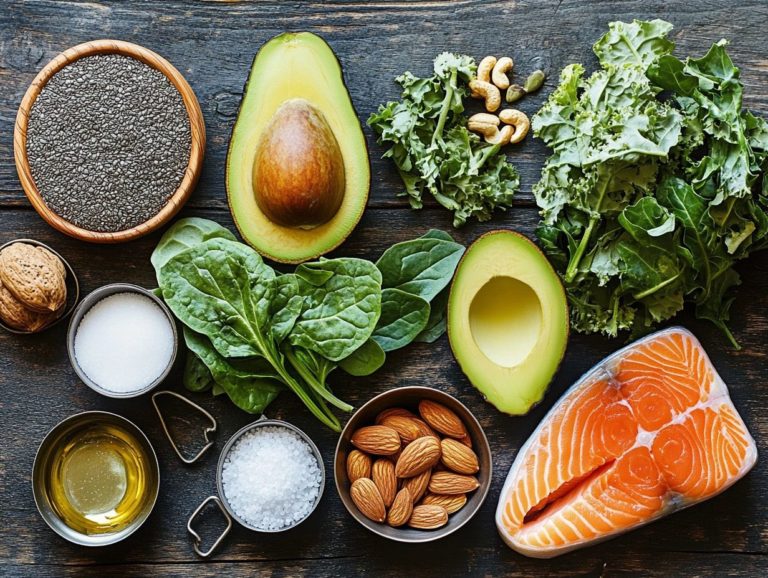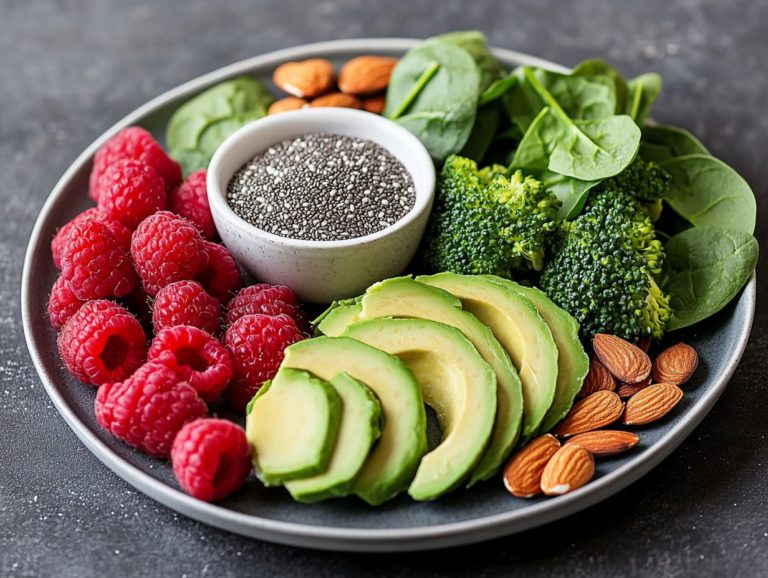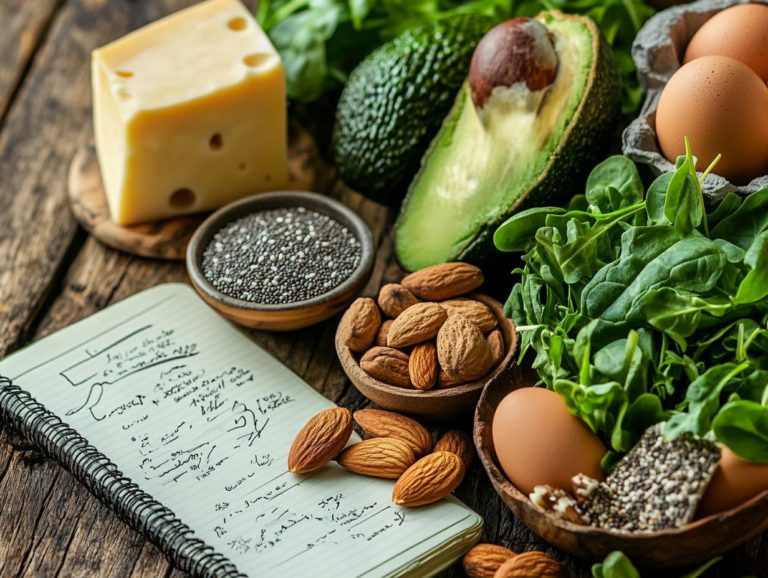Keto Diet: Importance of Hydration
The Keto diet has soared in popularity, renowned for its ability to facilitate weight loss and boost energy levels by significantly cutting back on carbohydrate intake. However, one crucial aspect that often flies under the radar is the vital role hydration plays in this low-carb lifestyle. Staying adequately hydrated is essential not just for maximizing the benefits of the Keto diet, but also for sidestepping those pesky side effects like muscle cramps and kidney stones that can arise.
In this article, you will delve into how the Keto diet affects your hydration levels, the importance of maintaining adequate water intake, the signs that may indicate dehydration, and practical strategies to ensure you remain well-hydrated while navigating your Keto journey. You will also discover how factors like electrolytes, sodium, potassium, and magnesium play a role in your overall fluid balance.
Contents
- Key Takeaways:
- What is the Keto Diet?
- Why is Hydration Important on the Keto Diet?
- Why is Hydration Important on the Keto Diet?
- How Much Water Should You Drink on the Keto Diet?
- What Are the Signs of Dehydration on the Keto Diet?
- How to Stay Hydrated on the Keto Diet?
- What Are the Best Hydrating Foods on the Keto Diet?
- 3. Coconut Water
- 4. Bone Broth
- 5. Electrolyte Supplements
- What Are the Risks of Dehydration on the Keto Diet?
- How to Prevent Dehydration on the Keto Diet?
- Frequently Asked Questions
- What is the importance of hydration on a Keto Diet?
- How much water should I be drinking on a Keto Diet?
- What are some signs of dehydration on a Keto Diet?
- Can I drink other beverages besides water on a Keto Diet?
- How can I make sure I am staying hydrated on a Keto Diet?
- What are some tips for staying hydrated while exercising on a Keto Diet?
Key Takeaways:
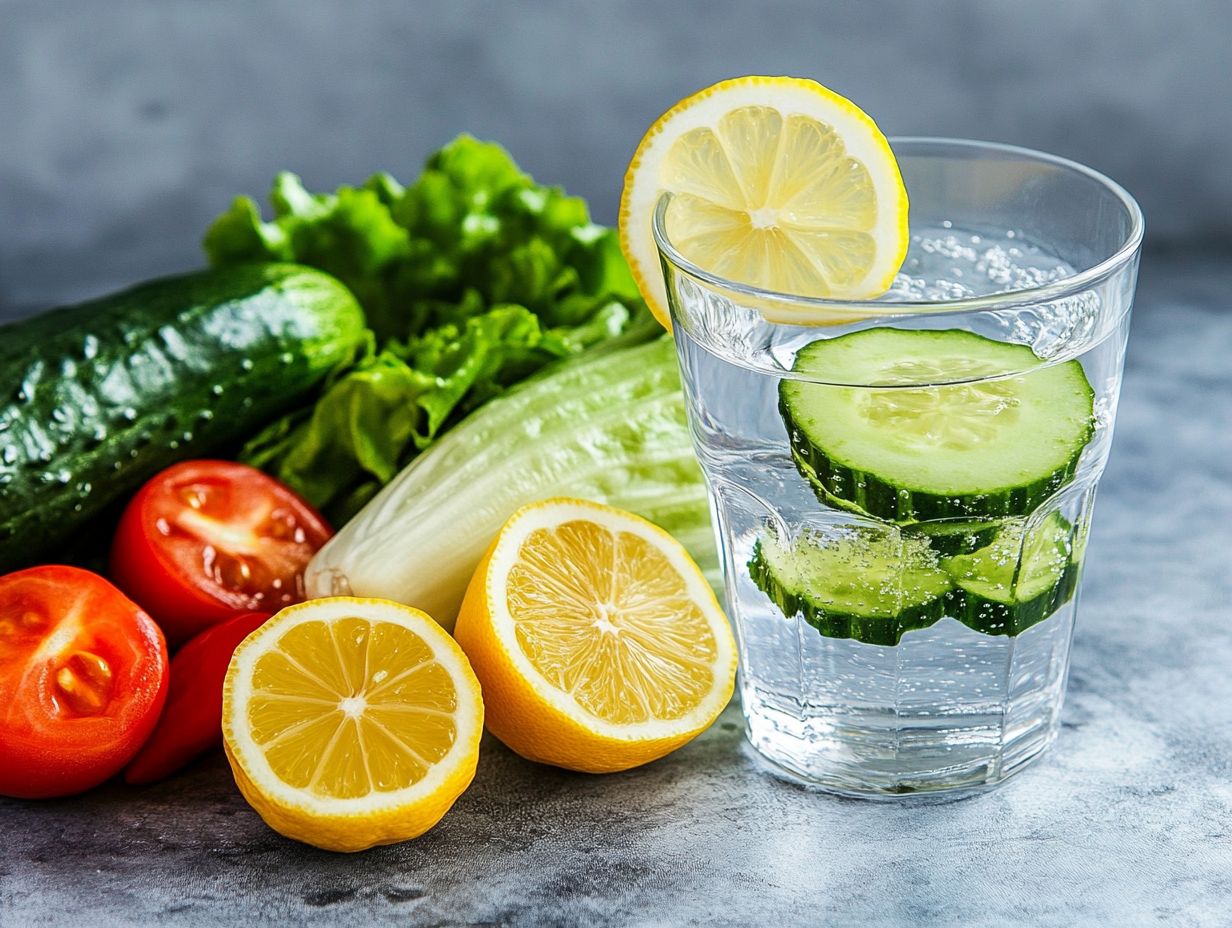
- Staying hydrated is crucial on the Keto Diet to maintain overall health and prevent dehydration.
- The Keto Diet can lead to dehydration due to reduced carbohydrate intake and increased water loss.
- Aim to drink at least 8-10 glasses of water every day to stay hydrated and energized on the Keto diet!
What is the Keto Diet?
The keto diet, or ketogenic diet, is a sophisticated approach characterized by low carbohydrate intake and high fat consumption, meticulously crafted to induce a state of ketosis, a metabolic state where your body burns fat for energy instead of carbohydrates. In this state, your body shifts its energy reliance from carbohydrates to fat and ketones, reducing insulin levels and stabilizing blood sugar.
This transformative dietary shift not only aims to facilitate weight loss but also enhances mental clarity and improves overall well-being by fundamentally altering how your body processes nutrients and generates energy.
By cutting back on carbs, the keto diet helps your body burn fat more effectively, leading to remarkable outcomes for your health and vitality, including reduced sugar cravings.
Why is Hydration Important on the Keto Diet?
Hydration plays a vital role when you embrace the keto diet, as this low-carb approach can profoundly impact your body s fluid balance and electrolyte levels, potentially leading to dehydration if not managed with care.
As you transition into ketosis, your body naturally loses more water and electrolytes. It s imperative to maintain optimal hydration to ward off complications like kidney stones and muscle cramps. Consult with experts like Dr. Julian Seifter for more personalized hydration strategies.
By prioritizing adequate water intake and replenishing your electrolytes, you can support your overall health while navigating the ketogenic lifestyle with confidence.
How Does the Keto Diet Affect Hydration?
The keto diet impacts your hydration primarily by changing your body s fluid retention and electrolyte balance due to the sharp drop in carbohydrate intake. This reduction can lead to rapid water loss and an increased risk of dehydration. As your body shifts from burning carbohydrates to utilizing fats and ketones for energy, your kidneys start losing excess water and electrolytes. This means you may become more susceptible to dehydration if you don t adjust your fluid and electrolyte intake accordingly.
This metabolic shift is significant because carbohydrates usually help retain fluid in your body. When you cut back on them, you might notice a decrease in glycogen stores, which are responsible for holding onto water. As a result, your overall body fluid levels can diminish. You ll likely find that your body has an increased need for electrolytes, as imbalances in sodium and potassium can occur, potentially leading to muscle cramps, fatigue, and other unwelcome symptoms.
Therefore, it s essential to pay close attention to both your fluid intake and the replenishment of vital electrolytes like sodium, potassium, magnesium, and calcium while following a ketogenic lifestyle. Doing so will help you maintain optimal hydration and overall health.
In conclusion, maintaining proper hydration while on the Keto diet is crucial for your health and well-being. By understanding the importance of water and electrolytes, you can navigate this dietary approach effectively.
Why is Hydration Important on the Keto Diet?
Hydration is crucial for maximizing the effectiveness of the keto diet. It helps you avoid issues like dehydration-related kidney stones and muscle cramps.
When you follow a keto diet, prioritizing proper hydration supports your fluid balance and overall bodily functions. It also helps minimize the side effects linked to such a dramatic dietary shift, ensuring a smoother transition into ketosis.
Dehydration can lead to fatigue and headaches, particularly troublesome during the early stages of the keto diet. As you reduce your carbohydrate intake, you may notice an uptick in urination, resulting in further fluid loss.
Make hydration a priority to effectively combat these common side effects. Staying well-hydrated promotes better digestion and helps maintain your electrolyte balance, reducing the risk of issues like muscle cramps.
Drinking enough fluids, especially water, electrolyte-rich beverages, and keto-friendly options like herbal teas or coffee, empowers you on your keto journey. This allows you to feel more energized and focused, which ultimately leads to better adherence to your diet and improved overall health.
How Much Water Should You Drink on the Keto Diet?
Determining the right amount of water to drink while following the keto diet is essential for maintaining optimal hydration. The precise quantity can vary based on several factors, including your body weight, activity level, and specific health needs.
Generally, it s advisable for those on a ketogenic diet to aim for at least 2 to 3 liters of water each day. This is vital for your success on the keto diet, given the diet’s diuretic effects and the potential for electrolyte imbalances that can arise from reduced carbohydrate intake. Celebrate milestones like National Hydration Day to remind yourself of the importance of water intake.
Prioritizing hydration will support your overall well-being and help you navigate your keto journey more effectively.
Factors That Affect Water Intake on the Keto Diet
Several factors influence your water intake needs while you’re on the keto diet, including your body weight, activity level, dietary choices, and the environment around you.
If you have a higher body weight or engage in vigorous exercise, you might need to increase your water consumption to replenish fluids lost and maintain proper hydration. This is especially important since the keto diet can lead to increased urination and fluid loss due to lower carbohydrate intake.
The types of foods you choose on the keto diet think high-fat, low-carb options can also affect your hydration levels. These foods typically contain less water compared to the fruits and vegetables found in other diets.
If you’re training in warmer climates or spending time outdoors, your hydration needs may escalate even further due to increased sweat loss. Consider adding bouillon to your food intake for additional sodium and hydration support.
Ultimately, personalizing your water intake based on these specific factors is essential for ensuring your optimal health and well-being on your keto journey.
What Are the Signs of Dehydration on the Keto Diet?
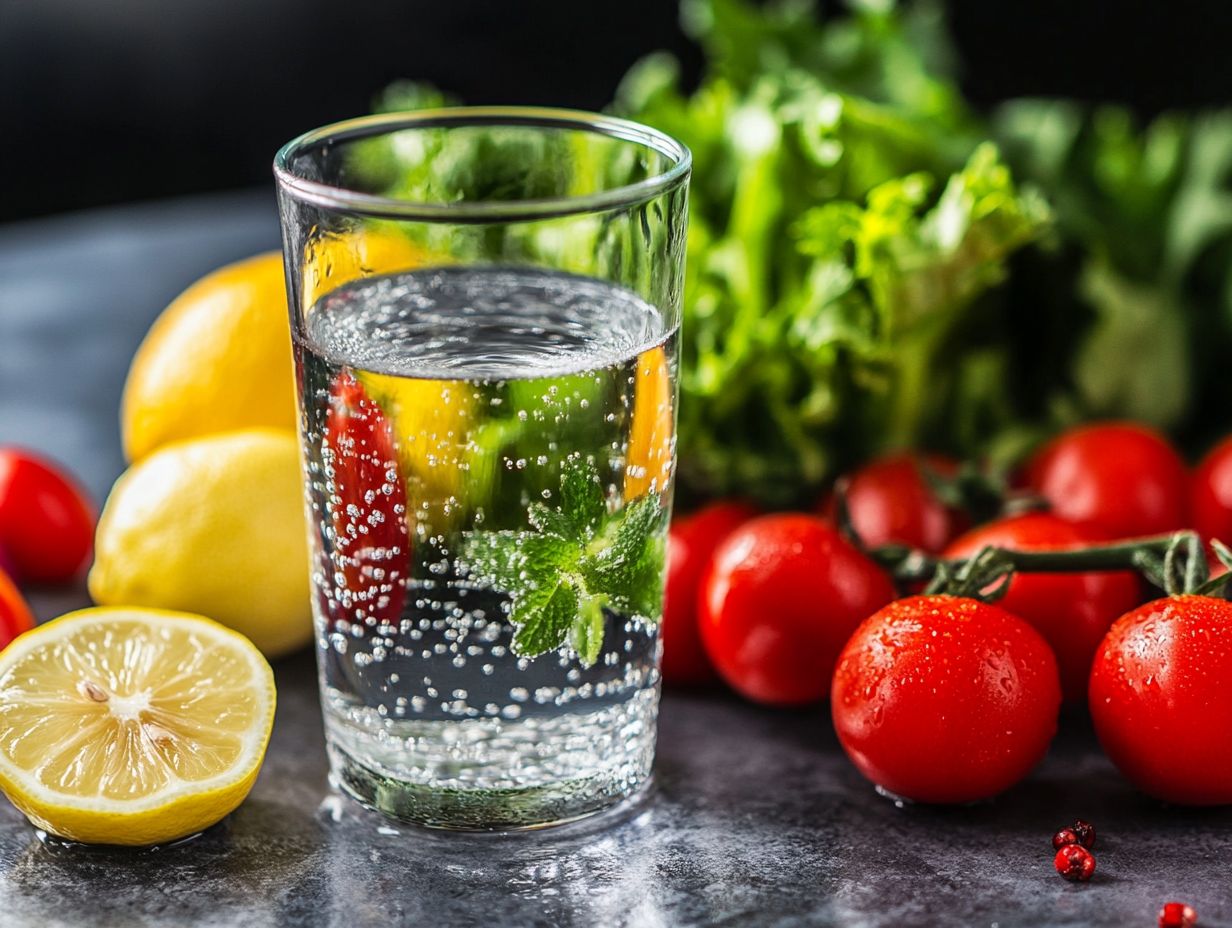
Recognizing the signs of dehydration is crucial for anyone on the keto diet, as the dietary adjustments can intensify fluid loss and elevate the risk of issues like muscle cramps, fatigue, and symptoms commonly associated with the keto flu.
You should be aware of the typical signs of dehydration such as heightened thirst, a dry mouth, fatigue, dizziness, and reduced urine output which can all indicate the necessity for a reevaluation of your hydration strategies. This is especially important for those who might inadvertently overlook their fluid intake during this dietary transition.
Stay vigilant about your hydration and share your keto hydration experiences with others to foster engagement and support!
How to Stay Hydrated on the Keto Diet?
To stay well-hydrated on the keto diet, employ practical strategies. Consistently drink adequate amounts of water throughout the day and replenish the electrolytes lost due to increased fluid excretion. Incorporate keto-friendly beverages, like herbal teas or electrolyte-enhanced waters, and pay attention to your thirst mechanism. These approaches can significantly aid in sustaining your hydration levels while meeting your body’s unique needs during this dietary transition.
Being proactive about your fluid intake is crucial, as it helps alleviate potential symptoms of the dreaded keto flu. Regularly consume electrolyte-rich foods think avocados, spinach, and nuts to support your body by counterbalancing the loss of essential minerals like calcium. Discover the amazing benefits of keto-compatible bone broth, which provides both hydration and nourishment.
Set reminders now! Keeping hydrated is essential for thriving on your low-carb lifestyle.
What Are the Best Hydrating Foods on the Keto Diet?
Incorporating hydrating foods into your keto diet can greatly elevate your hydration levels while supplying essential nutrients for your overall well-being. Consider foods like leafy greens, avocados, coconut water, and bone broth; they not only provide hydration benefits but also deliver valuable electrolytes such as magnesium, potassium, and calcium. These choices are ideal for anyone striving to maintain fluid balance while enjoying the ketogenic lifestyle.
1. Leafy Greens
Leafy greens are an excellent source of hydration and contain essential electrolytes such as magnesium and calcium, which are vital for maintaining fluid balance on the keto diet.
Leafy greens like spinach, kale, and Swiss chard are low in carbohydrates and incredibly hydrating. They are rich in essential vitamins and minerals, providing hydration while delivering important electrolytes, crucial for overall health. According to Dr. Julian Seifter, a renowned expert, maintaining electrolyte balance is essential for well-being.
Integrating these vibrant vegetables into your daily meals can significantly elevate your nutritional profile. They are packed with antioxidants that combat oxidative stress and promote better metabolic health. Their high water content ensures you stay adequately hydrated, especially on a low-carb diet, which often leads to increased water loss. Celebrate National Hydration Day as a reminder to prioritize hydration.
By making leafy greens a regular part of your diet, you savor a variety of flavors and textures while maintaining your electrolyte balance, supporting your energy levels and preventing muscle cramps. The Institute of Medicine emphasizes the importance of a balanced diet rich in electrolytes for optimal health.
2. Avocados (Nature’s Butter)
Enhance your hydration with avocados while on the keto diet. They are packed with healthy fats and a generous dose of potassium, essential for maintaining electrolyte balance. Their creamy texture and versatility allow you to elevate salads, smoothies, and other keto-friendly dishes, ensuring you remain hydrated while enjoying a nutrient-dense meal plan.
These nutrient-dense fruits not only provide a satisfying creaminess but also serve as a foundation for various recipes. Slice them onto grilled meats, whip up zesty guacamole, or blend them into rich, creamy dressings this is how you embrace the benefits of healthy fats.
Effortlessly enhance your breakfast with avocados in omelets or savor them as a standalone snack, seamlessly integrating them into your daily meals. Their remarkable ability to complement both savory and sweet flavors makes them invaluable for anyone navigating the keto lifestyle.
3. Coconut Water
Coconut water stands as a natural source of hydration and electrolytes, making it an excellent choice for you on a keto diet just remember to enjoy it in moderation due to its carbohydrate content.
Packed with potassium and other essential electrolytes, coconut water helps replenish fluids you may lose while dieting. It offers a refreshing taste that transforms hydration into a pleasure.
Incorporating coconut water into your keto regimen provides vital minerals that support your overall wellness and help prevent the cramping often linked to electrolyte imbalances. It s important to keep an eye on your serving size to ensure your carbohydrate intake stays in check.
Just a few ounces can improve the taste of your smoothies or act as a hydrating base for other low-carb beverages, boosting both flavor and nutrition without derailing your ketosis. When enjoyed thoughtfully, coconut water can become a valuable ally in your balanced approach to hydration throughout your low-carb journey.
In America, coconut water has gained popularity for its natural hydrating properties and electrolyte content.
4. Bone Broth
Imagine cozying up with a warm cup of nourishing bone broth your body will thank you! Bone broth is a nourishing and hydrating beverage that seamlessly integrates into your keto diet, offering essential nutrients and electrolytes vital for maintaining hydration and overall health.
This rich, flavorful broth not only quenches your thirst but also supports gut health and replenishes electrolytes, making it an exceptional choice for anyone looking to elevate their wellness on a ketogenic journey.
Packed with collagen, amino acids, and a variety of minerals, bone broth provides a unique blend of benefits that can significantly enhance your overall well-being.
As you navigate the keto diet often associated with dehydration this nourishing elixir becomes a dependable ally in restoring vital fluid levels. Its warm, comforting essence makes it the perfect option for soothing your body while meeting your hydration needs.
Not to mention, the potassium and magnesium in bone broth play a crucial role in maintaining proper electrolyte balance, essential for sustaining energy levels and muscle function.
Whether you savor it as a warm drink or use it as a flavorful base for soups and stews, incorporating this nutrient-dense option into your routine can effectively support your keto lifestyle. Adding bouillon to your bone broth can further enhance its flavor and nutritional benefits.
5. Electrolyte Supplements
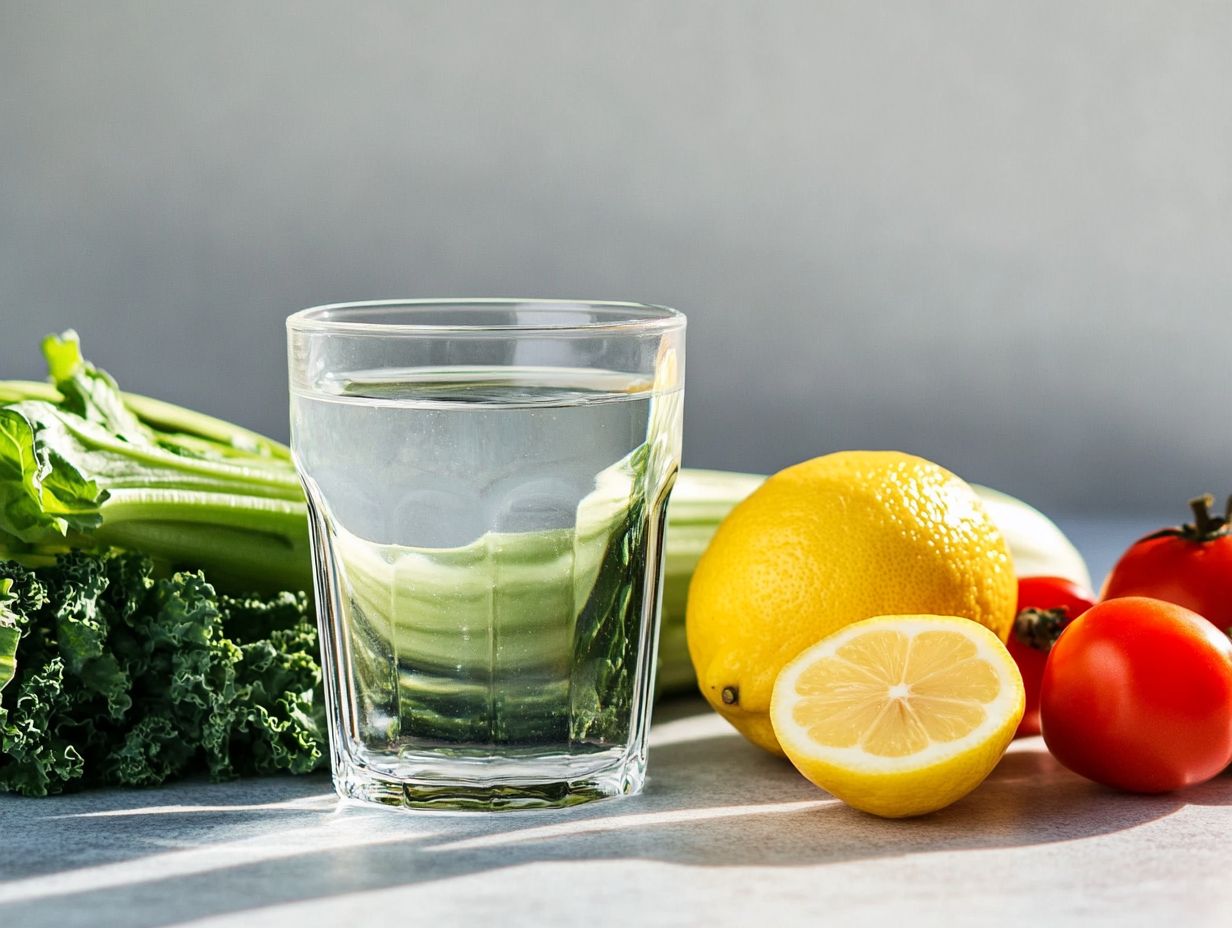
Electrolyte supplements serve as a powerful ally in your quest for hydration and mineral replenishment while navigating the keto diet, especially during those initial days of transitioning into ketosis. These supplements typically include essential electrolytes such as sodium, potassium, and magnesium key players in supporting your fluid balance and warding off dehydration-related symptoms.
As you embark on your ketogenic journey, your body will undergo significant changes, increasing the chances of electrolyte depletion due to a drop in carbohydrate intake. This is precisely where electrolyte supplements prove their worth; they not only help alleviate common keto flu symptoms like fatigue and muscle cramps but also ensure that your physiological functions remain optimal.
By providing these vital minerals, the supplements play an essential role in helping you sustain energy levels, support muscle function, and enhance your overall health. Incorporating these hydrating aids into your keto strategy can significantly elevate your experience, facilitating a smoother transition and encouraging long-term adherence to your dietary goals.
Don’t wait until you’re dehydrated make electrolyte supplements a part of your daily routine!
What Are the Risks of Dehydration on the Keto Diet?
The risks of dehydration while following the keto diet can result in a variety of health concerns, such as kidney stones, muscle cramps, headaches, and symptoms commonly linked to the keto flu.
As your body transitions into ketosis and experiences increased fluid loss, you may find yourself more vulnerable to these complications if you don t prioritize hydration and electrolyte replenishment. Neglecting these essential elements can ultimately compromise the advantages of embracing the ketogenic lifestyle.
How to Prevent Dehydration on the Keto Diet?
To prevent dehydration while following the keto diet, you need a proactive strategy that emphasizes adequate water intake and a balanced balance of minerals in your body. This is crucial for maintaining your overall health and well-being during this dietary shift.
Consider consistently drinking enough water, incorporating hydrating foods into your meals, and supplementing with electrolytes to offset the natural diuretic effects of the ketogenic diet. By doing so, you ll ensure that your body remains well-hydrated and functions at its best.
1. Drink Enough Water
Drinking enough water is vital for hydration on the keto diet. Proper fluid intake supports your bodily functions. It also helps you avoid dehydration-related complications. Establish a routine for sipping water throughout the day. Aim for 2 to 3 liters based on your individual needs and activity levels.
Incorporating hydration into your daily life can be simple. Set reminders on your smartphone or use a reusable water bottle that tracks your intake. Infusing water with citrus fruits or herbs adds a delightful twist and encourages you to drink more often.
Consuming foods with high water content, such as cucumbers, lettuce, and soups, can aid in meeting your hydration goals. Pay attention to signs of dehydration, like fatigue or dry skin. These cues can prompt timely adjustments to your water consumption and reinforce the importance of staying hydrated on your keto journey.
2. Monitor Electrolyte Intake
Monitoring your electrolyte intake is essential on the keto diet to prevent imbalances. Increased fluid loss and dietary changes can lead to these imbalances. Pay close attention to your sodium, potassium, and magnesium levels. Incorporate electrolyte-rich foods or supplements into your diet. This will help you maintain proper hydration and support your overall health on your ketogenic journey.
Being vigilant about these minerals boosts your energy levels. It also helps you avoid issues like muscle cramps, fatigue, or headaches from insufficient intake. Foods such as avocados, leafy greens, and nuts can significantly improve your mineral balance. Keep tabs on your fluid consumption throughout the day. Proper hydration is crucial when your body adjusts to ketosis, as dehydration can worsen symptoms of the dreaded ‘keto flu.’
Ultimately, take a thoughtful approach to managing your electrolytes. This will lead to a smoother and more effective ketogenic experience. Stay alert about your electrolyte levels, particularly when making significant dietary changes like adopting a keto diet.
3. Avoid Excessive Exercise
Avoid excessive exercise during the initial stages of the keto diet. Intense physical activity can worsen fluid loss and elevate the risk of dehydration. As your body adapts to burning fat for energy, moderate your exercise routines to help maintain hydration levels. This supports a smoother transition into ketosis and promotes better health outcomes.
Pushing yourself too hard during workouts on this low-carb lifestyle makes you more vulnerable to dehydration. This is particularly important, as the keto diet can lead to initial water loss and an electrolyte imbalance. Proper hydration is crucial to mitigate these effects.
Instead, focus on balanced workouts that include low-impact activities like walking or yoga. These activities enhance your endurance and flexibility without stressing your body. Prioritizing hydration through ample water intake and electrolyte-rich foods will facilitate optimal performance and recovery. This ensures your exercise routine complements rather than hinders your ketogenic journey.
Act now to prevent dehydration! Start tracking your water intake today to ensure you re hydrated! Remember to manage your electrolytes effectively and maintain a balanced approach to exercise for the best results on your keto diet.
4. Listen to Your Body
Listening to your body is paramount for maintaining hydration on the keto diet. Your thirst mechanism serves as a reliable indicator of your fluid needs. Pay close attention to signs like thirst, dry mouth, or fatigue. Respond by increasing your water intake and electrolyte consumption to ensure your body remains properly hydrated and functioning at its best.
Know that hydration needs can vary significantly based on factors such as your activity level, the climate you re in, and the composition of your diet. For example, if you’re engaging in intense workouts, you may require more fluids. Additionally, hot weather can heighten the risk of dehydration.
By cultivating a routine that includes regular hydration checks and tuning into how your body feels, you can customize your fluid intake to better match your personal health requirements. Embracing this self-awareness not only deepens your connection to your body s responses but also enhances your keto journey and supports your overall well-being.
Frequently Asked Questions
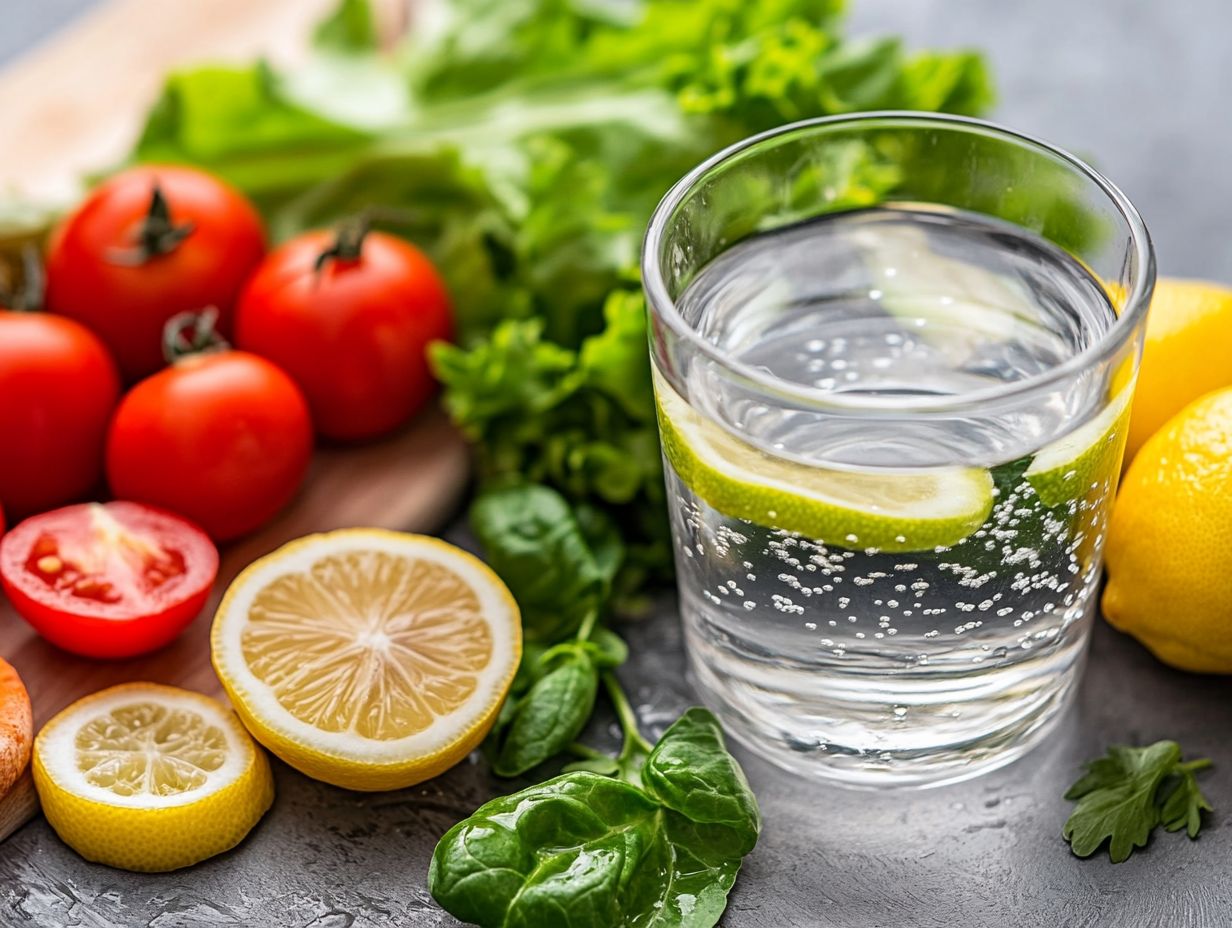
What is the importance of hydration on a Keto Diet?
Hydration is essential for maintaining the proper balance of minerals that help your body function. This is especially important on a Keto Diet. When your body is in a state of ketosis, it uses fat for energy instead of carbohydrates. This process can cause a loss of water and minerals. Proper hydration can help replenish these minerals and keep your body functioning properly. The Institute of Medicine recommends that men consume about 3.7 liters (125 ounces) of total water daily, and women consume 2.7 liters (91 ounces) to stay properly hydrated.
How much water should I be drinking on a Keto Diet?
It is recommended to drink at least half of your body weight in ounces of water each day while on a Keto Diet. For example, if you weigh 150 pounds, you should aim to drink 75 ounces of water. However, this amount may vary depending on individual factors such as activity level and climate.
What are some signs of dehydration on a Keto Diet?
Some common signs of dehydration include feeling thirsty, dark yellow urine, dry mouth, fatigue, and headache. It is important to pay attention to these signs and increase your water intake if necessary.
Can I drink other beverages besides water on a Keto Diet?
While water is the best choice for hydration, you can also drink other keto-friendly beverages such as unsweetened tea or coffee and sugar-free electrolyte drinks. Just be sure to avoid sugary drinks and fruit juices, which can kick you out of ketosis and hinder your hydration efforts.
How can I make sure I am staying hydrated on a Keto Diet?
Aside from drinking enough water, you can ensure proper hydration by including high water content foods in your meals, such as leafy greens, cucumbers, and zucchini. You can also maintain hydration by incorporating electrolyte supplements or adding mineral-rich foods like avocado and salmon to your diet.
What are some tips for staying hydrated while exercising on a Keto Diet?
When exercising on a Keto Diet, it is important to drink plenty of water before, during, and after your workout. You may also want to consider adding electrolyte supplements or drinking coconut water, which is a natural source of electrolytes. Incorporating bouillon can also provide a good source of sodium. Be sure to listen to your body and increase your water intake if you feel dehydrated during or after your workout.

